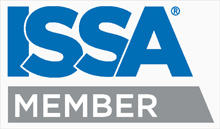Grout Care: Know Your Grout
The grout in your facility most likely goes largely unnoticed unless there are problems with it: soiling, discoloration, or loose tiles. Many facilities don’t spend a lot of time caring for their grout until these problems arise, but knowing your grout and how to properly care for and repair it is often a necessity of a healthy facility.
Grout is not a flooring surface like ceramic or vinyl tiles. It is a porous, cement-like material that serves various purposes in flooring. It fills spaces between tiles, keeps moisture from getting underneath tiles, protects the edges of the tiles, from cracking or chipping, and helps keep tiles secured and in the proper place.
There are two main types of grout: sanded and unsanded. Sanded grout contains sand while unsanded does not. Adding sand gives added strength and is commonly used on floor surfaces, while unsanded grout is typically used on walls, where extra durability is not needed. Sanded grout can become as hard as cement when fully dried or cured.
There are a few other types of grout as well. Epoxy grout is much more stain resistant but also much more expensive. Latex-modified grout has less water and oil absorption and resists discoloration. Furan grout is highly chemical resistant and is most commonly used in industrial settings.
Since grout is a cement-based material, it is very porous and absorbent. This means that any liquid that gets onto it can quickly be soaked in and become problematic. Depending on the liquid, it can cause corrosion, staining, or odors. The best way to hinder these problems is to use a sealer that provides water and oil repellency, which will also help resist stains and discoloration. This sealer should be applied not immediately after installation, but a few days later, allowing the grout enough time to properly cure. This sealer should be stripped off and resealed as often as once per year to ensure proper protection. If the grout has already started to get discolored, the sealant has worn off long ago.
When it comes to cleaning grout, daily cleaning can be done with certain types of autoscrubbers, usually those made for smaller areas. They often use cylindrical brushes that can scrub between tiles and effectively clean the grout. Restoration for grout that is old and has been discolored often requires the use of chemicals and special procedures.
While grout is usually not a primary concern when it comes to facility maintenance, it is still very important to properly care for it. This can help to prolong the life of your floors and keep them looking like new.
For more information on grout maintenance and restoration, check out the Multi-Clean Method Bulletin on Grouted Tile Floor Care.


